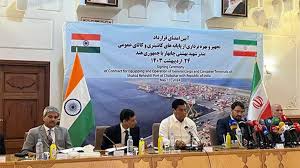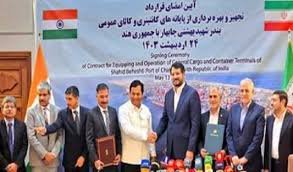India Inks 10-Year Deal to Operate Iran’s Chabahar Port
India has recently sealed a significant 10-year deal with Iran, securing the rights to operate and manage the strategically located Chabahar Port. This pact comes as a crucial milestone in bolstering India’s connectivity with Afghanistan and Central Asia, enhancing its geopolitical influence in the region. The Chabahar Port, situated in the Gulf of Oman, not only offers India an alternative route to access Afghanistan and Central Asia but also serves as a vital trade gateway, bypassing Pakistan.
Deal Overview
Under the agreement, India is granted operational control of two terminals at the Chabahar Port for a duration of ten years. This move marks a significant stride in strengthening India’s foothold in the region, particularly amidst growing tensions with China in the Indian Ocean.
Strategic Importance
The Chabahar Port serves as a key component of India’s ambitious International North-South Transport Corridor (INSTC) project, aimed at facilitating trade and transport between India, Iran, Afghanistan, and Central Asia. By gaining operational control over the port, India aims to circumvent logistical challenges posed by Pakistan’s refusal to grant transit access to Indian goods destined for Afghanistan and beyond.
Economic Implications
This deal opens up new avenues for India to capitalize on the untapped economic potential of the region, particularly in sectors like energy, infrastructure development, and trade. It also paves the way for increased bilateral trade between India and Iran, fostering economic growth and development.
Geopolitical Dynamics
India’s investment in the Chabahar Port not only strengthens its ties with Iran but also serves as a counterbalance to China’s expanding influence in the region, particularly through its Belt and Road Initiative (BRI). By deepening its engagement in the development of the port, India aims to maintain its strategic autonomy and safeguard its interests in the face of evolving geopolitical dynamics.
Security Concerns
While the deal promises significant economic and strategic benefits, it also poses security challenges, given the volatile geopolitical environment in the region. India will need to navigate carefully to ensure the security and stability of the Chabahar Port amidst escalating tensions and competing interests.

Why this News is Important
Strengthening Regional Connectivity
The agreement to operate the Chabahar Port underscores India’s commitment to enhancing regional connectivity and trade ties with Afghanistan and Central Asia.
Geopolitical Significance
India’s investment in the Chabahar Port serves as a strategic counterbalance to China’s growing influence in the region, contributing to the broader geopolitical dynamics of the Indo-Pacific.
Economic Opportunities
The deal presents lucrative economic opportunities for India, facilitating access to untapped markets and resources in Iran, Afghanistan, and Central Asia.
Diversification of Trade Routes
By gaining operational control of the Chabahar Port, India reduces its dependency on traditional trade routes, particularly those passing through Pakistan, thus ensuring greater resilience in its trade infrastructure.
Security Implications
The security of the Chabahar Port is paramount, given its strategic significance and the volatile nature of the region, necessitating careful management of security concerns.
Historical Context
Development of Chabahar Port
The Chabahar Port has been a focal point of India’s strategic interests since the early 2000s, with discussions on its development gaining momentum in the wake of geopolitical shifts in the region.
Indo-Iranian Relations
India’s ties with Iran have deep historical roots, spanning cultural, economic, and strategic dimensions. The Chabahar Port project represents a significant milestone in Indo-Iranian cooperation, further cementing bilateral relations.
Regional Geopolitics
The development of the Chabahar Port is intertwined with broader regional geopolitics, including India’s efforts to counterbalance China’s influence in the Indo-Pacific and secure its strategic interests.
Key Takeaways from “India Inks 10-Year Deal to Operate Iran’s Chabahar Port”
| Serial Number | Key Takeaway |
|---|---|
| 1 | India secures operational control of two terminals at Iran’s Chabahar Port for a period of 10 years. |
| 2 | The deal strengthens India’s connectivity with Afghanistan and Central Asia, bypassing Pakistan. |
| 3 | Chabahar Port is a crucial component of India’s International North-South Transport Corridor (INSTC). |
| 4 | India’s investment in the port serves as a strategic counterbalance to China’s expanding influence. |
| 5 | Security concerns remain paramount, requiring careful management to ensure the port’s stability. |
Important FAQs for Students from this News
1. What is the significance of the Chabahar Port agreement for India?
- The Chabahar Port agreement grants India operational control of two terminals at the port for 10 years, facilitating connectivity with Afghanistan and Central Asia while bypassing Pakistan.
2. How does the Chabahar Port agreement impact India’s geopolitical position?
- The agreement enhances India’s strategic influence in the region by countering China’s expanding presence and securing vital trade routes.
3. What is the International North-South Transport Corridor (INSTC)?
- INSTC is a multi-modal transportation network connecting India, Iran, Afghanistan, and Central Asia, with Chabahar Port serving as a crucial node.
4. What are the economic opportunities associated with the Chabahar Port agreement?
- The agreement opens up new markets and resources in Iran, Afghanistan, and Central Asia, fostering economic growth and development for India.
5. How does the Chabahar Port agreement address India’s security concerns?
- Security remains a priority, requiring careful management to ensure stability amidst regional tensions and competing interests.
Some Important Current Affairs Links

















 Exciting News!
Exciting News!  Join Our Telegram Channel Now!
Join Our Telegram Channel Now!
 Join our Telegram channel for a thrilling adventure into the world of daily current affairs.
Join our Telegram channel for a thrilling adventure into the world of daily current affairs. 
 Don’t miss out on the latest updates and insights! Click to join now and be part of the knowledge revolution!
Don’t miss out on the latest updates and insights! Click to join now and be part of the knowledge revolution! 
